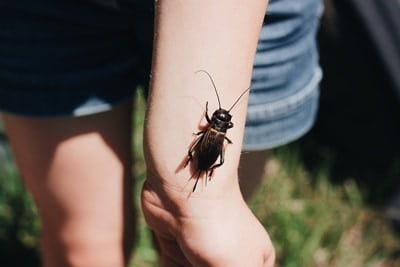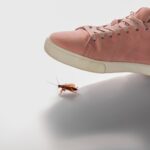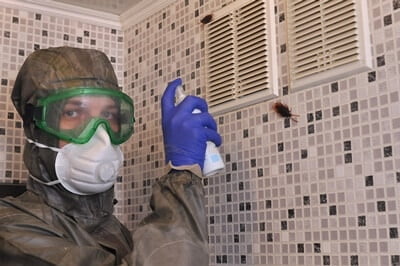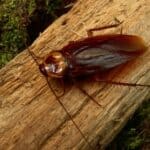Cockroaches rarely bite humans, but they may do so if they’re starving or feel threatened. If you receive a cockroach bite, it’s likely to heal on its own. However, a bite may cause skin irritation, infection, and swelling.
The pain from a cockroach bite can vary in severity, depending on the force applied. In most cases, you’re likely to feel a pinch or twinge, but the discomfort only lasts for a few seconds. However, cockroaches can deliver bites with a force of up to 50 times their body weight.
The bite could trigger an allergic reaction as your white blood cells (immune system) attack the cockroach allergens. In more severe cases, a bite from a cockroach may trigger anaphylaxis. This is characterized by symptoms such as shortness of breath, low blood pressure, and shock.
Can You Die From a Cockroach Bite?
While cockroach bites can be uncomfortable, you’re very unlikely to die from getting bitten. However, cockroach saliva often carries a multitude of bacteria and germs that can transmit illnesses and diseases to humans.
Getting bitten by an infected cockroach can cause diarrheal illnesses, such as typhoid fever, cholera, and dysentery. If not diagnosed and treated early, these diseases can be life-threatening.
Are Cockroach Bites Common?
Cockroaches rarely bite people, especially if there are other sources of food. However, they may bite if they’re experiencing starvation due to food scarcity or when they feel threatened.
Cockroaches are afraid of humans and won’t dare come near them when they’re awake. Nonetheless, some cockroaches will fight back by biting if they perceive you as a danger to them.
Even still, most cockroach bites usually occur at night during sleep.
Do Cockroach Bites Hurt?
Cockroach bites can be painful, although the severity of the pain depends on the amount of force applied. Despite their small size, cockroaches are capable of delivering a bite force of up to 50 times their body weight.
According to PLOS One, the powerful bite of a cockroach is attributed to strong mandibles with sharp edges. With such force, a cockroach bite can cause damage to skin tissues in the affected area.
Depending on your pain tolerance, you may experience mild discomfort or serious pain from a cockroach bite. Moreover, such a bite can cause lesions, irritation, and swelling.
Therefore, even if you do not feel much pain during the bite, the aftermath of it can be quite uncomfortable.
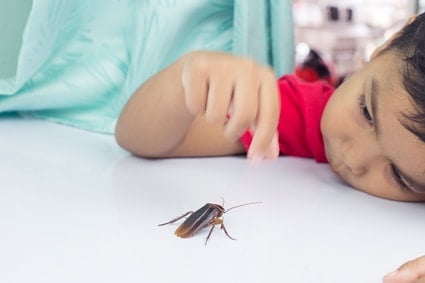
Do Cockroach Bites Itch?
A cockroach bite will lead to itchiness. If the bite is infected, it might cause the affected area to swell and fill with pus.
Do Cockroach Bites Go Away?
Most cockroach bites cause irritation and swelling, which can last several days. The good news is that most bites eventually heal by themselves after a couple of days.
How To Tell You Have Been Bitten By a Cockroach
Cockroach bites are similar in appearance to bites by other insects, such as bed bugs, ticks, and mites.
For this reason, it’s easy to mistake a bite from a cockroach for another bug unless you catch the culprit in the act. Nevertheless, there are physical signs that can help you determine whether a cockroach has bitten you.
Unlike bed bugs (which tend to be small in size), cockroach bites are large, with a diameter of between 1 to 4 mm. They will usually become red.
Likewise, cockroach bites tend to be singular. This is because cockroaches don’t bite humans unless they feel threatened and are starving.
By contrast, bed bugs rely on sucking blood to survive. They will bite multiple times in a straight or zig-zag line.
Can Cockroach Bites Make You Sick?
Cockroaches are infamous for living in filthy environments like sewers and drainage pipes. Here, they feed on decaying food matter and wastes. They harbor many pathogens that can cause deadly diseases in humans.
According to the Journal of Pharmacy and Biological Sciences, roaches are carriers of numerous diarrheal infections. They not only spread diseases by contaminating food and water via direct contact but also through infected bites.
Some that are spread through cockroach bites include:
Salmonellosis
Cockroaches are carriers and transmitters of the salmonella bacteria, which can cause salmonellosis. This disease is characterized by symptoms similar to food poisoning.
Cockroaches are thought to accumulate salmonella bacteria by feeding on contaminated food. The bacteria are then retained in their digestive system for a month or more. This is transmitted to humans through bites and consumption of contaminated food or water.
Commonly reported symptoms of salmonellosis are vomiting, fever, and diarrhea. These symptoms begin within 12-72 hours after infection and may last anywhere between 4-7 days.
Most patients make a successful recovery without any medication. However, individuals with severe and persistent symptoms can be treated using antibiotics.
Cholera
Cholera is an infection caused by the bacterium vibrio cholerae. While this illness is usually associated with consuming contaminated food and water, it can also be transmitted via infected cockroach bites.
Symptoms like acute diarrhea and vomiting characterize cholera. These may lead to severe dehydration, which can prove fatal if left untreated.
Typhoid Fever
Typhoid fever is a highly infectious disease caused by salmonella typhi. These bacteria can be found in the vomit, saliva, and feces of infected cockroaches.
Symptoms of this illness include:
- Diarrhea
- Constipation
- Stomach pain
- Fever
- Chronic fatigue
If treatment is administered early, symptoms of typhoid fever usually dissipate within 3-5 days. Without treatment, however, the symptoms can get worse over time and become life-threatening.
Leprosy
Cockroaches are carriers of mycobacterium leprae, which causes leprosy. They not only spread this disease to humans through direct contact with feces but also through bites.
While the bacterium that causes leprosy is not highly infectious, if not treated early, it can cause severe damage to the:
- Nerves
- Skin
- Eyes
This can lead to disfigurement and deformities. Nevertheless, leprosy is treatable with multi-medication therapy (MDT).
Plague
While plague is often associated with rodents such as rats and mice, this infectious disease can also be spread by cockroaches. The yersinia pestis bacterium (which causes plague) can be found in the saliva of cockroaches and transmitted to humans through bites.
Common symptoms of plague include:
- Fever
- Muscle cramps
- Chills
- Swollen and painful lymph nodes
If antibiotic treatment is not administered within 24 hours of infection, it can lead to death.
Campylobacteriosis
This is an infectious disease caused by the campylobacter bacteria. One subspecies of the bacteria known as Campylobacter jejuni has been found to exist inside the gut of American cockroaches.
While transmission mainly occurs through consuming food or water contaminated by cockroach saliva and feces, this disease can also be spread via bites.
Symptoms of campylobacteriosis include:
- Muscle cramps
- Fever
- Bloody diarrhea
- Abdominal pain
In most healthy individuals with a strong immune system, symptoms of campylobacteriosis usually go away within 2-10 days without any treatment. However, one needs to constantly replenish fluids to prevent dehydration.
Staphylococcus Aureus
This gram-positive bacteria is predominantly found on human skin, groin area, and armpits. While it is generally harmless, staphylococcus aureus can cause many infections if it enters the body through an open wound. Cockroaches are also known to carry the bacteria in their gut and can spread it through their saliva and vomit.
Common infections likely to occur include soft tissue infections, such as abscesses (boils), furuncles, and cellulitis. While most staphylococcus infections are not life-threatening, s.aureus can cause severe illnesses, including:
- Pneumonia
- Bone and joint infection
- Bloodstream infections
Individuals whose immune systems have been compromised are generally more susceptible to developing serious illness from exposure to S.aureus.
Listeriosis
Listeriosis is a bacterial infection caused by listeria monocytogenes. It is mainly contracted by consuming contaminated food or water, although bites from infected cockroaches may also lead to infection.
Children, pregnant women, and adults with a weakened immune system have a higher risk of contracting listeriosis. However, there have been reports of individuals with a strong immune system being affected by this condition.
Symptoms of listeriosis include:
- Diarrhea
- Muscle aches
- Fever
- Headaches
- Disorientation
Dysentery
Dysentery is a gastrointestinal infection commonly spread through poor hand hygiene and consumption of contaminated food and drinks. The shigella bacteria, which causes bacillary dysentery, often live in the guts of cockroaches. It can be transmitted to humans through bites.
Commonly reported symptoms of dysentery include:
- Nausea
- Stomach cramps
- Fever
- Vomiting
- Diarrhea
Most patients exhibit mild symptoms, which go away within a week without any medical treatment.
Allergic Reactions from Cockroach Bites
In addition to spreading a wide range of bacterial infections, cockroach bites can also cause severe allergic reactions. This is especially true among children and adults with compromised immune systems. They are at a high risk of experiencing severe allergic reactions from cockroach bites.
Cockroach allergies often occur when one’s immune system reacts to the allergens found in the saliva, vomit, and feces of cockroaches. The allergens can also cause reactions when inhaled in the air.
Symptoms of cockroach allergies are similar to those of other common allergies, such as mites and dust. They include:
- Nasal congestion
- Wheezing
- Sneezing
- Skin rash
- Itchy skin, throats, eyes, and nose
- Sinus infections
- Ear infections
The severity of the symptoms depends on the health status of an individual.
Cockroach Bites and Asthma
The allergens from cockroach bites are known to cause or exacerbate symptoms of asthma in both children and adults. This is especially common in urban settlements with large cockroach populations.
Common symptoms of cockroach-related asthma attacks include:
- Chest pain and discomfort
- Difficulty breathing
- Wheezing
In extreme cases, cockroach bites can cause anaphylaxis. This is characterized by symptoms such as:
- Low blood pressure
- Shock
- Shortness of breath
- Rashes
If not treated promptly, asthmatic reactions from cockroach bites can lead to fatality.
Are Cockroach Bites Dangerous?
Although rare, cockroaches do bite, and those bites can be dangerous.
Roaches harbor many germs in their gut systems and body surface. They can transmit diseases such as salmonellosis, typhoid fever, dysentery, cholera, and campylobacteriosis through their saliva and vomit.
In addition, cockroach bites can trigger allergic reactions and asthma when the proteins found in their saliva react with white blood cells in an individual’s blood.
Do Cockroaches Bite in the Daytime or Night?
Cockroaches are nocturnal creatures. This means they tend to be most active during the night.
Consequently, cockroach bites are more likely to happen during the night when one is asleep since you’ll pose little to no danger to the cockroach.
What Do Cockroach Bites Look Like?
Cockroach bites are often mistaken for other insect bites like bed bugs, mosquitoes, and fleas. However, there are several subtle signs that can help you identify whether you are dealing with a cockroach bite.
The most obvious way is by catching it in the act. Nevertheless, this is not always possible since a cockroach is most likely to bite you during the night as you sleep.
If you cannot catch the culprit in the act, you can determine whether a bite you’re suffering from was delivered by a cockroach by examining the appearance.
Physical signs of a cockroach bite include:
- Small red bumps on the skin
- Itchiness on the site of the bite
- Swelling
Cockroach vs. Bed Bug Bite
While bites from cockroaches and bedbugs are quite similar, they differ in several ways. Bed bugs have a more aggressive bite and tend to bite humans more since they survive by sucking blood. Cockroaches rarely bite humans unless they are threatened or can’t find an alternative source of food.
Here are key differences between a cockroach and a bed bug’s bite:
| Cockroach Bite | Bed Bug Bite |
|---|---|
| Single large red bumps on the skin | Multiple red bumps in a line or zigzag pattern |
| Uniform red patch on the affected area of the bite | Dark center with a lighter surrounding area |
| Swollen tissue on the site of the bite | Inflamed flat patches on the area of the bite |
How to Treat Cockroach Bites
Once bitten by a cockroach, take the necessary precautions to reduce the likelihood of infection. Your first step is cleaning the wound with soap and water. This will disinfect the bite location and prevent bacteria from entering.
Refrain from rubbing or squeezing the site of the bite, as this can cause inflammation. You should also avoid scratching the wound since this increases the possibility of infection.
Once the wound is disinfected, apply a cold compress to prevent swelling. If you do not have a cold compress at home, you can create one by putting several ice cubes in a plastic bag and covering it with a small towel.
If the swelling has not subsided several hours after disinfecting the bite location, visit a pharmacy to purchase over-the-counter medication.
How to Prevent Cockroach Bites
While cockroach bites aren’t fatal, they can be painful and may spread illnesses that can be fatal. It’s critical to take the necessary safety precautions to protect yourself and your family from cockroach bites.
Cockroaches are drawn to filthy environments and are usually attracted by the smell of leftover food or rotting food. To prevent cockroach bites, therefore, you should maintain a clean and tidy environment, especially in areas where you prepare, store or dispose of food.
To keep other pests at bay, make sure your kitchen, dining area, and sink are squeaky clean. Furthermore, you need to ensure that trash bins are always covered to discourage cockroaches from nesting inside.
Cockroaches tend to bite body parts such as hands, fingers, and mouth since these are more likely to harbor food particles. You should wash your hands and mouth after dinner and before going to bed.
The most effective solution to prevent cockroach bites is to regularly monitor your home for signs of infestation. Setting up cockroach traps can help you get rid of cockroaches in the early stages of infestation and prevent them from multiplying.
If you’re already dealing with a full-blown infestation, however, it is best to enlist a pest control service to help you remove cockroaches from your home.
